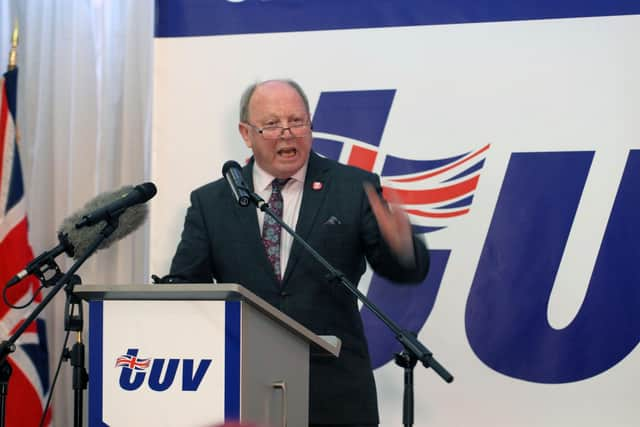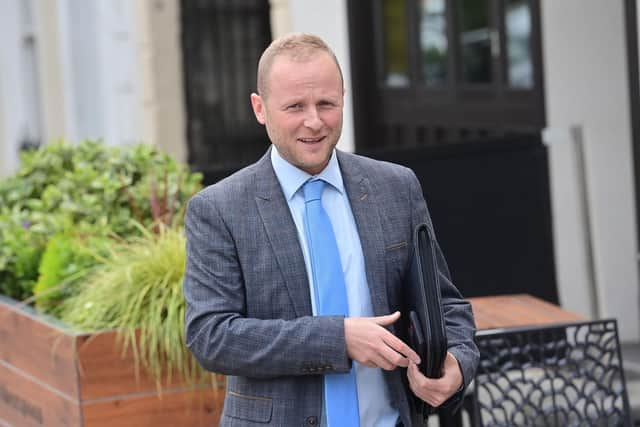Allister and Bryson hit back at unionist academic's claim that legally restoring the Act of Union would be a 'disaster'


The unionist academic, writing in Monday’s News Letter, said that the focus by Mr Bryson and Jim Allister on “legalistic attempts to ‘restore’ Article 6 would be a disaster – both economically and in allowing the strategic direction of unionism to be set by people whose understanding of the constitutional history of the Union does not stand up to scrutiny”.
Professor Patterson said restoring the Acts of Union to ‘pre-protocol’ status would be “a very bad business indeed” – arguing that there has always been differentiation between Northern Ireland and the rest of the United Kingdom.
Advertisement
Hide AdAdvertisement
Hide AdJamie Bryson said Professor Patterson “fundamentally misunderstands” the legislation and the key piece of constitutional legislation needs to be understood in a legal context.


The Centre for the Union director said: “Henry Patterson’s fundamental mistake is – strangely perhaps – to see too much in Article Six. Article Six is not about some general commitment to equal treatment in socio-economic matters. Article Six provides that Great Britain and Northern Ireland shall be on an equal footing as to trade.”
Mr Bryson added: “Nothing in the Acts of Union 1800 (and Article VI in particular) ever required a colourless homogeneity between Ireland and Great Britain, any more that such a homogeneity was required by the Scottish Union of 1707.
“Nothing in the Government of Ireland Act 1920 offended the Acts of Union, and – to reach further back – nothing in the different measures for Ireland, for example, in relation to land, enacted by Parliament offended the Acts of Union.”
Advertisement
Hide AdAdvertisement
Hide AdArticle Six of the Act of Union has become a key battleground in the intra-unionist debate over the NI Protocol and Windsor Framework since a court ruling that it had been suspended by the introduction of the Northern Ireland Protocol. The DUP’s position is that any new arrangements will be set against their seven tests – the first of which is to “Fulfil Article Six of the Articles of Union, which requires that everyone in the United Kingdom is entitled to the same privilege”.


Jamie Bryson and Jim Allister say that only restoration of the legislation – alongside the removal of key pieces of protocol legislation – can remove the Irish Sea border.
Jim Allister accused Professor Patterson of adopting a “selective interpretation” of ArticIe VI of the Act of Union. The North Antrim MLA said: “It takes a very skewed view of history and constitutional law to conclude that the restoration of Article Six would be ‘disastrous’! Article Six is not some incidental or archaic provision it is fundamental to the very existence of the United Kingdom”.
Read Jamie Bryson’s full article in response to Professor Henry Patterson below:
Advertisement
Hide AdAdvertisement
Hide AdIn Henry Patterson’s article in today’s Newsletter he fundamentally misunderstands Article 6 of the Acts of Union. He does so with admirable confidence, but given his fundamental understanding is fatally flawed, all that flows from it is equally erroneous.
Mr Patterson, following the deceptive efforts of some in the DUP who are trying to avoid their commitments by now seeking to extract from Article 6 some form of subjective guarantee, which is seemingly detached from the legal text of Article 6 itself.
Put simply, Mr Patterson studiously and tellingly avoids engaging with the most obvious issue arising from this proposition: if the ‘guarantee’ of Article 6- which he says “is a good thing”- isn’t that which is guaranteed in the legal text of Article 6, then what is it?
There is no answer to that, and it exposes the deceptive nature of seeking to create an escape hatch from the clear and unequivocal commitments the DUP have made.
Advertisement
Hide AdAdvertisement
Hide AdArticle 6 of the Acts of Union is part of the Constitution of the United Kingdom. It can also accurately, but more modestly, be described as a twin provision found in an Act of the Parliament of Ireland and in an Act of the Parliament of Great Britain.
To analyse this provision properly it is necessary both to read it and understand it. Is it possible that Henry Patterson has done neither of these things? It seems possible that he has not done both.
When he complains of a ‘legalistic’ reading of Article VI, I simply point out that we are talking about law – constitutional law – and suggest that a close an attentive reading, a legalistic reading if you will, is exactly what is required if we are not to drift away from this fundamental guarantee.
Nothing in the Acts of Union 1800 (and Article VI in particular) ever required a colourless homogeneity between Ireland and Great Britain, any more that such a homogeneity was required by the Scottish Union of 1707.
Advertisement
Hide AdAdvertisement
Hide AdNothing in the Government of Ireland Act 1920 offended the Acts of Union, and – to reach further back – nothing in the different measures for Ireland, for example, in relation to land, enacted by Parliament offended the Acts of Union.
One creation of the Acts of Union – the unification of the established Church of England and the established Church of Ireland – was specifically repealed by the Irish Church Act 1869.
Henry Patterson’s fundamental mistake is – strangely perhaps – to see too much in Article VI. Article VI is not about some general commitment to equal treatment in socio-economic matters. Article VI provides that Great Britain and Northern Ireland shall be on an equal footing as to trade.
We do not know if the various measures that Professor Patterson cites would have survived a legal challenge because none was apparently made but we do know that none of these measures subjected Northern Ireland (as the Protocol does) to laws made outside the United Kingdom. We do know that none of these measures put Northern Ireland into a different customs area than the rest of the United Kingdom (as the Protocol does) and we know that none of these measures, or any other measure historically, put a customs barrier between Northern Ireland and Great Britain.
Advertisement
Hide AdAdvertisement
Hide AdThe Supreme Court has told us that Article VI has been suspended by the domestic effect given to the Protocol. For Unionists it is not merely a legalistic fixation to have that suspension removed, and removed completely, it is, to use a phrase canonised in a different and opposing context, nothing less than a constitutional imperative.
Moreover, Professor Patterson postulates that it is “overstated” to say the Protocol Framework creates an ‘all-Ireland economy’. This, again, is simply wrong. NI is de-jure part of the EU single market for goods. This, as a condition precedent, means NI is aligned with the same rules and standards in this large part of our economy as the Irish Republic. Already in respect of the mountain of EU law applying via Annex 2 of the Protocol, this creates different rules governing NI than that which applies to the rest of the UK.
That Professor Patterson rests his proposition on saying the assertion is “overstated” and that the effect of the ‘all-Ireland economy’ is “limited” is itself a concession that there is such an effect. The dispute seems to be one of degree.
Unionism finding itself in the situation of arguing an ‘all-Ireland economy’ is ok so long as it is “limited” seems to be an odd approach. It essentially resolves to saying that some form of economic United Ireland is fine, so long as there remains some UK alignment.
Advertisement
Hide AdAdvertisement
Hide AdThis essentially amounts to an argument for, or at least acceptance of, constitutional hybridity. If that is the position, then it amounts to support for the Protocol/Framework: a position every elected unionist has rightly rejected.
Finally, somewhat oddly, Professor Patterson concludes that unionists need to be in Stormont to challenge republicanism’s re-writing of history. It is of course true that such a challenge must be relentlessly made, but it is a non-sequitur to say that this necessitates unionist participation in imbalanced power sharing institutions which requires acceptance and implementation of an Irish Sea border.
The international case being brought against the UK by the Irish Government as a matter falling within international relations. It is therefore an excepted matter (see Schedule 2, paragraph 3 of the NI Act 1998). Therefore, what could be done within Stormont in regards challenging this, which cant be down outside of it?
If there are those in unionism who wish to abandon their clear commitments and promises, and who are willing in consequence to now accept the Irish Sea border, then they should simply honestly front up and say so, rather than bending themselves into all sorts of intellectual shapes trying to escape from what they once claimed were matters of fundamental and unalterable principle.
Advertisement
Hide AdAdvertisement
Hide AdProfessor Patterson makes a valiant effort to provide some intellectual capital to be drawn upon by such persons to assist their arguments. But the proposition advanced, whilst being superficially attractive and mesmerising, doesn’t stand up to the most elementary scrutiny.
Jamie Bryson, NI Director of Policy, Centre for the Union